
- Jul 03, 2025
Lesotho’s Top Import: Refined Petroleum
A report by Import Globals on Lesotho Import Custom Data states that the nation lacks significant natural resources and industrial capability, especially in the energy sector, as a result of its geographic and developmental limitations. Because of this, it has to import a lot of necessities, and in recent years, refined petroleum has become its most popular import.
Lesotho relies heavily on refined petroleum to fuel its limited infrastructure for electrical production, machinery, and transportation. According to Import Globals' Lesotho Import Trade Analysis, the nation continuously devotes a sizeable amount of its import budget to petroleum products, even in the face of slow economic growth and a low GDP. Lesotho's energy vulnerability is emphasized by this dependency, which also emphasizes the significance of stable trade connections and price monitoring in the global petroleum market.
General Economy of Lesotho
The modest economy of Lesotho is mostly reliant on commerce with South Africa, textile production, remittances, and agriculture. Through common customs fees and levies, the nation's membership in the Southern African Customs Union (SACU) offers a vital source of income. Due to frequent droughts and unfavorable soil conditions, agriculture employs a sizable number of the people but only makes up a small amount of the GDP, according to Lesotho Export Data From Import Globals. One of the few official job areas, particularly for women, is the textile industry, which is driven by exports to the United States under the African Growth and Opportunity Act (AGOA).
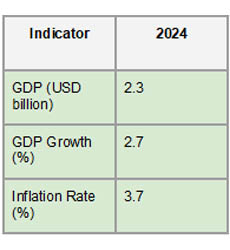
Even with these sources of income, Lesotho continues to struggle economically with issues like high unemployment, poverty, and inequality. Approximately one-third of the population is below the federal poverty threshold. According to Import Globals' Lesotho Import Data, the nation also depends significantly on help and remittances, particularly from Basotho who work in South Africa. Through infrastructure development, public financial reforms, and efforts to draw in foreign investment, Lesotho has worked to stabilize its economy in recent years. However, the nation's fragile economy is still under pressure from outside sources, such as shifting SACU revenues and changes in the price of commodities globally.
Refined Petroleum Import Data
Data on Lesotho's imports of refined petroleum from 2020 to 2024 shows a steady and necessary need for fuel products. According to Lesotho Import Trade Statistics by Import Globals, the nation has steadily relied on refined petroleum over the past five years, importing about USD 200 million a year. The consistency of import value and volume indicates that industrial consumption patterns have not changed significantly or that energy sourcing has not been very diversified. Transportation, government functions, and small-scale electricity production, especially in isolated or off-grid locations, are the main uses of refined petroleum.
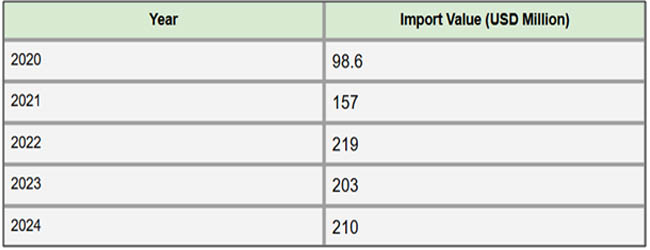
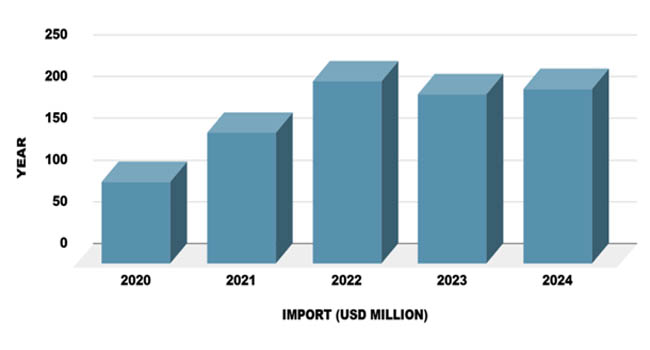
Lesotho's import spending stayed mostly constant throughout this time despite changes in the price of oil around the world, particularly the steep decline in 2020 brought on by the COVID-19 pandemic and the increase in 2022 brought on by geopolitical concerns. Long-standing trade accords, especially with South Africa, Lesotho's primary supplier and transit partner, may be the reason for this stability, per a report by Import Globals on Lesotho Import Shipments Data. Due to a lack of domestic alternatives or fuel storage infrastructure, it also highlights the nation's susceptibility to foreign price shocks and its limited capacity to absorb or react to disturbances in the global market.
Major Import Partners for Refined Petroleum
South Africa provides more than 95% of Lesotho's fuel needs, making it the country's main import partner for refined petroleum. Geographical closeness, shared infrastructure, and membership in the Southern African Customs Union (SACU), which permits duty-free trade among member states, are the main causes of this substantial trade dependency, according to the Lesotho Import Export Trade Analysis From Import Globals. South Africa is the most sensible and economical supplier for Lesotho because of its existing refinery and distribution system. Despite Lesotho's rugged topography, fuel is carried by road through several border crossings, guaranteeing comparatively seamless logistical operations.
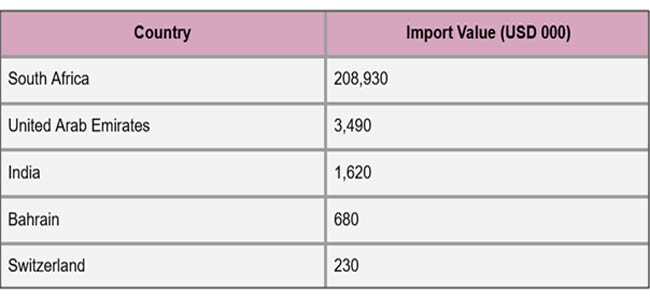
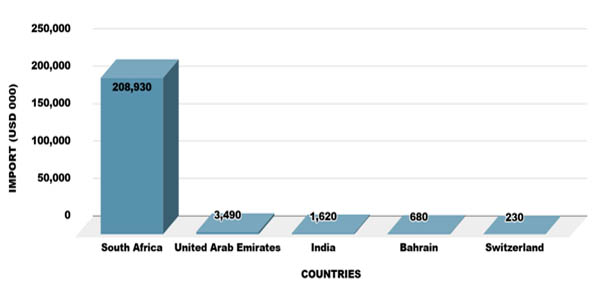
Other import partners include the United Arab Emirates, India, Bahrain, and Switzerland, though their contributions are minimal compared to South Africa’s. These nations sometimes provide modest amounts of refined petroleum, usually when the world's oil supply networks are rerouted because of political or price issues. Lesotho's reliance on a single dominant partner for its most important import, however, renders its energy security extremely susceptible to any disruptions in South African production or policy, according to Lesotho Export Import Global Trade Data by Import Globals. This emphasizes the necessity for Lesotho to invest in other energy sources or investigate regional diversification tactics.
Analysis of the Product
HS Code for Refined Petroleum: 2710
Applications include fuel for automobiles, power plants, and industrial equipment.
Imports are necessary because Lesotho lacks its oil refineries, according to Lesotho Import Data From Import Globals.
Fuels, including gasoline, diesel, kerosene, and jet fuel, are all included in the broad category of refined petroleum, which is categorized under HS Code 2710. The most often utilized types in Lesotho are gasoline and diesel, which power the nation's small-scale enterprises, public services, and transportation network. Since Lesotho lacks capabilities for producing or refining crude oil domestically, all refined petroleum is imported, making it an essential yet externally sourced part of the country's economy(Lesotho Import Export Global Data). The government and consumers bear a heavy financial burden as a result of this reliance, particularly when oil prices are rising globally.
Beyond its economic significance, refined petroleum plays a key role in Lesotho's development, mobility, and service provision. Fuel is necessary for generators used in building projects, schools, and rural clinics, in addition to automobiles. Lesotho must invest in storage capacity and sustain solid trade connections to prevent supply disruptions due to the lack of domestic refining infrastructure, according to Lesotho Export Data From Import Globals. The nation also has environmental issues related to the usage of fossil fuels, which highlights the necessity for long-term plans to strike a balance between sustainability and energy security, maybe by integrating renewable energy sources gradually.
Implications for Strategy
- Energy Security: Lesotho is susceptible to external supply shocks due to its heavy reliance on imports.
- Economic Impact: Changes in the price of oil around the world can have a big impact on the national budget and trade balance.
- Infrastructure: Supply bottlenecks may result from inadequate distribution and storage facilities.
Significant strategic ramifications result from Lesotho's high reliance on imported refined petroleum, particularly regarding policy planning, economic stability, and energy security. Due to this reliance, the nation is vulnerable to outside shocks, including fluctuations in world prices, interruptions in the supply chain, and political shifts in important supplier countries like South Africa. Lesotho must create a more robust energy strategy that includes diversifying import sources, funding national fuel storage infrastructure, encouraging energy efficiency, and progressively integrating renewable energy alternatives like solar and wind to reduce these risks, according to Import Globals' Lesotho Import Export Trade Analysis. In addition to lowering vulnerability, a proactive approach will promote environmental resilience and sustainable economic growth.
Predicted Patterns & Costs
Geopolitical concerns and changes in demand are expected to keep oil prices fluctuating globally. Lesotho's import expenses for refined petroleum are anticipated to mirror these worldwide patterns, according to Lesotho Export Data Supplied by Import Globals. Some dangers may be reduced by initiatives to enhance infrastructure and diversify energy sources.
In the future, Lesotho's import trends for refined petroleum are anticipated to stay consistent in terms of volume, but they will be impacted by changes in the price of oil globally, which will have a direct impact on total import expenses. According to the Lesotho Export Import Global Trade Data, prices may experience both short-term spikes and long-term corrections as the world market responds to geopolitical tensions, OPEC decisions, and changes in demand brought on by the switch to green energy. Due to its weak infrastructure and lack of negotiating leverage, Lesotho will continue to be vulnerable to volatile gasoline prices. The expense of petroleum imports may put more strain on state finances and increase the trade deficit unless strategic initiatives like long-term contracts, regional energy cooperation, or alternative energy investments are explored.
In conclusion
Refined petroleum continues to be a vital component of Lesotho's import portfolio, supporting important economic sectors. Although import levels are stable at the moment, the country's strong reliance on outside sources highlights the necessity of strategic planning in infrastructure development and energy diversification, according to Lesotho Import Export Trade Data From Import Globals.
To sum up, refined petroleum continues to be an important but precarious part of Lesotho's economy, powering crucial industries like small-scale manufacturing, public services, and transportation. Its steady import levels demonstrate how dependent the nation continues to be on outside sources, especially South Africa, for energy security. Although this dependence guarantees functionality in the near term, it presents long-term dangers such as supply disruptions, price shocks, and financial strain. Lesotho needs to implement strategic interventions to ensure a more stable and sustainable energy future. These interventions could include developing fuel reserves, diversifying import partners, investing in renewable energy infrastructure, and reforming policies.
If you are looking for detailed and up-to-date Lesotho Import Data, You Can Contact Import Globals.
FAQs
Que: What makes refined petroleum the most important import for Lesotho?
Ans: Lesotho is dependent on imports to meet its fuel demands because it cannot produce and refine its oil.
Que: Who are Lesotho's primary suppliers of refined petroleum?
Ans: With the majority of imports coming from South Africa, the UAE, India, Bahrain, and Switzerland are the top suppliers.
Que: What is the economic impact of imported refined petroleum on Lesotho?
Ans: It affects inflation and fiscal stability by adding to the trade deficit and exposing the economy to changes in the price of oil globally.
Que: How can Lesotho lessen its reliance on imported refined petroleum?
Ans: Reliance can be decreased by making investments in renewable energy sources, improving energy efficiency, and creating alternate fuels for transportation.
Que. Where to obtain detailed Lesotho Import Data?
Ans. Visit www.importglobals.com or email info@importglobals.com for more information on up-to-date Lesotho Import Data.
